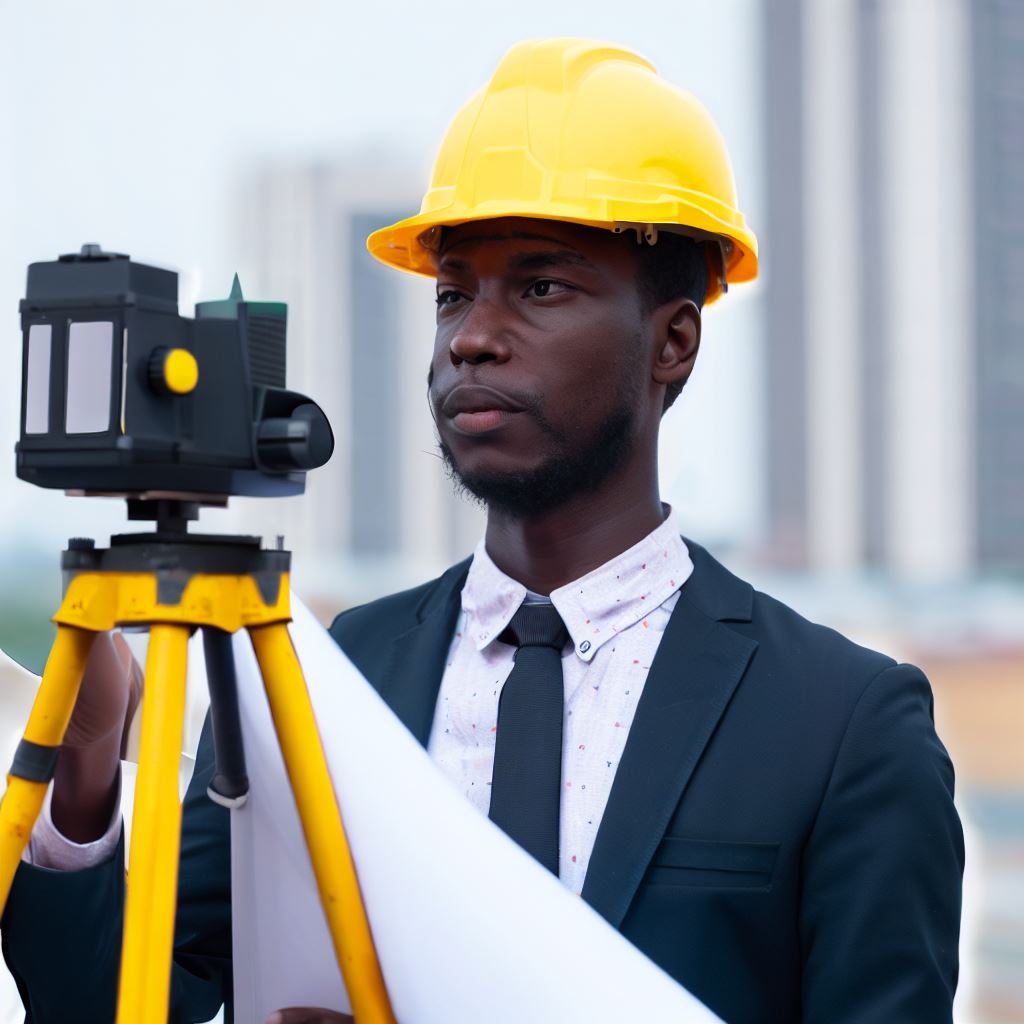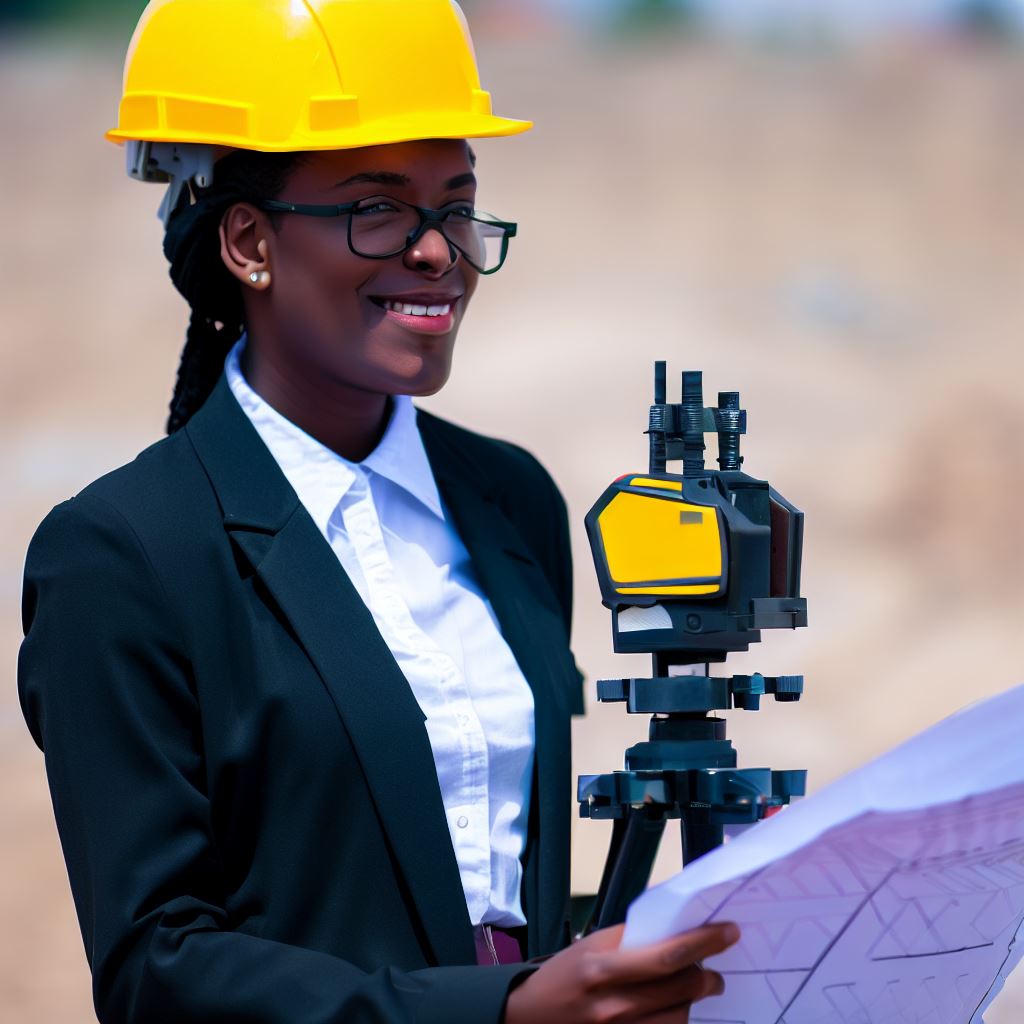Introduction
Surveying plays a crucial role in Nigeria’s development and growth. It enables proper land management, infrastructure planning, and resource allocation.
This blog post focuses on the education and licensing process within the field of surveying in Nigeria.
The Importance of Surveying in Nigeria
A. Significance of accurate surveying in land acquisition, development, and infrastructure projects
Accurate surveying is crucial in land acquisition, development, and infrastructure projects in Nigeria.
- Surveying ensures proper identification and documentation of land boundaries, preventing disputes.
- Surveyors play a vital role in establishing property rights and securing legal boundaries.
- Accurate survey measurements aid in determining land value for taxation and compensation purposes.
- Surveying helps in the planning and design of infrastructure projects such as roads, bridges, and buildings.
- It ensures that construction projects are carried out within the appropriate boundaries, avoiding encroachments.
- Survey data helps in the allocation of resources, facilitating sustainable land use and development.
- Surveying also plays a crucial role in disaster management and risk assessment for vulnerable areas.
B. The role of surveyors in ensuring property rights and legal boundaries
Surveyors in Nigeria have the responsibility to uphold professional standards and best practices.
- They must ensure accurate measurements, proper documentation, and adherence to legal requirements.
- Surveyors help in resolving boundary disputes and ensuring fair distribution of land resources.
- They collaborate with other professionals like lawyers, architects, and engineers to achieve project goals.
- Surveyors provide expert advice on land suitability, topography, and potential environmental impacts.
- They play a crucial role in the decision-making process for land development and infrastructure projects.
The licensing process for surveyors in Nigeria is rigorous and ensures competency in the field.
- Aspiring surveyors must first obtain a degree in surveying or a related field from a recognized institution.
- They then undergo practical training under the supervision of registered surveyors.
- After completing the training, individuals must pass the professional competency examination.
- Upon successful completion, they can apply for a license from the Surveyors Council of Nigeria (SURCON).
- Licensed surveyors are required to continuously update their knowledge and skills through professional development.
- Failure to comply with ethical standards and professional conduct can result in license revocation.
- SURCON is responsible for regulating the surveying profession in Nigeria and ensuring public safety.
In essence, accurate surveying plays a vital role in land acquisition, development, and infrastructure projects in Nigeria.
Surveyors play a significant role in ensuring property rights, resolving boundary disputes, and providing expert advice.
The licensing process ensures qualified and competent surveyors uphold professional standards, benefiting both the industry and the general public.
Read: Nigerian Police and Cybercrime: How They Tackle the Issue
Overview of Surveying Education in Nigeria
A. Educational requirements for becoming a surveyor in Nigeria
In Nigeria, to become a surveyor, one must fulfill certain educational requirements.
These requirements are designed to ensure that surveyors possess the necessary knowledge and skills to carry out their duties effectively.
To begin the journey towards becoming a surveyor in Nigeria, one must have at least a secondary school education. This serves as the foundation for further studies in the field of surveying.
B. Different degrees and programs available in surveying
After completing secondary school, aspiring surveyors can pursue a Bachelor’s degree in surveying.
This degree program typically lasts for four years and covers various aspects of surveying, including geodesy, cadastral surveying, and land administration.
Apart from the Bachelor’s degree, specialized Master’s and Ph.D. programs are also available for those who are interested in furthering their education in surveying.
These programs provide advanced knowledge and specialized training in specific areas of surveying.
C. The importance of accreditation and recognition from professional bodies
Accreditation and recognition from professional bodies play a crucial role in the surveying education process in Nigeria.
Professional bodies such as the Nigerian Institution of Surveyors (NIS) and the Surveyors Council of Nigeria (SURCON) ensure that surveying programs meet certain standards of quality and relevance.
Accreditation from these bodies ensures that the education provided by surveying programs is up to par with international standards.
It also ensures that graduates of accredited programs are equipped with the necessary knowledge and skills to excel in their careers as surveyors.
Accreditation is obtained by surveying programs through a rigorous evaluation process.
The evaluation assesses various aspects of the program, including faculty qualifications, curriculum content, teaching methodologies, and facilities.
Recognition from professional bodies is equally important.
Recognition serves as an official acknowledgment that a surveying program meets the standards set by the professional bodies in terms of curriculum and graduate competencies.
Students who graduate from recognized programs have an added advantage when seeking employment or pursuing further studies internationally.
Employers and educational institutions recognize the value of a surveying degree from a recognized program, giving graduates a competitive edge in the job market.
In summary, surveying education in Nigeria requires a foundational secondary school education, followed by a Bachelor’s degree in surveying.
Specialized Master’s and Ph.D. programs are also available for those interested in furthering their education.
Accreditation and recognition from professional bodies are essential to ensure the quality and relevance of surveying programs and give graduates a competitive edge in their careers.
Read: The Effect of Political Influence on Policing in Nigeria
Licensing Process for Surveyors in Nigeria
Obtaining a surveying license in Nigeria involves several steps, requirements, and the involvement of regulatory bodies.
This section will discuss the process in detail.
A. Steps Involved in Obtaining a Surveying License
- Graduate from an accredited surveying program or obtain a relevant degree in surveying.
- Complete a period of practical experience under the supervision of a licensed surveyor.
- Apply for registration with the relevant regulatory body responsible for surveying licenses.
- Pass the licensing examinations conducted by the regulatory body.
- Submit all required documents, such as academic transcripts and proof of practical experience.
- Pay the necessary fees for registration and licensing.
B. Requirements for Obtaining a Surveying License
Aside from completing the necessary steps, surveyors in Nigeria must meet specific requirements to obtain their licenses.
- Experience: Surveyors must gain practical experience by working under the guidance of a licensed surveyor. The duration and nature of this experience may vary depending on the regulatory body.
- Examinations: Surveyors are required to pass licensing examinations, typically administered by the regulatory body. These exams assess the candidate’s knowledge, skills, and understanding of surveying principles and practices.
- Ethical Standards: Surveyors must adhere to strict ethical standards to ensure professionalism and integrity in the field. They should demonstrate ethical behavior and uphold the principles of honesty, fairness, and confidentiality.
C. Role of Regulatory Bodies
Regulatory bodies play a crucial role in enforcing licensing regulations and maintaining the standards of the surveying profession in Nigeria.
- Registration: Regulatory bodies are responsible for the registration of surveyors. They verify the credentials and qualifications of applicants to ensure they meet the required standards.
- Licensing Examinations: These bodies conduct licensing examinations to assess the competence and knowledge of aspiring surveyors. The exams evaluate theoretical concepts, practical skills, and ethical understanding.
- Enforcement of Ethical Standards: Regulatory bodies monitor the ethical conduct of licensed surveyors. They investigate complaints, conduct disciplinary actions, and ensure adherence to professional codes of conduct.
- Continuing Professional Development: These bodies encourage continuous learning and professional development among licensed surveyors. They may require surveyors to participate in workshops, seminars, and trainings to stay updated with the latest advancements in the field.
- Quality Assurance: Regulatory bodies maintain the quality and standards of surveying education and practice in Nigeria. They establish guidelines, review curriculum, and evaluate surveying programs offered by educational institutions.
In fact, obtaining a surveying license in Nigeria involves completing the necessary steps, meeting experience and examination requirements, and adhering to ethical standards.
Regulatory bodies play a significant role in ensuring the integrity and professionalism of the surveying profession.
Read: Crime Prevention Strategies: A Nigerian Police Perspective

Challenges in Surveying Education and Licensing in Nigeria
Aspiring surveyors in Nigeria face numerous difficulties in their path towards obtaining proper education and licensing.
These challenges hinder the growth and development of the surveying profession in the country.
In this section, we will identify the difficulties faced by aspiring surveyors and discuss the issues of lack of infrastructure, inadequate funding, and limited access to educational resources.
Furthermore, we will highlight the need for government support and investment in the field of surveying.
A. Difficulties faced by aspiring surveyors in Nigeria
1. Lack of proper infrastructure
- Limited availability of surveying equipment and tools, making practical training difficult.
- Inadequate surveying laboratories and facilities, hindering hands-on learning experiences.
- Outdated or non-existent Geographical Information System (GIS) infrastructure, impeding modern surveying techniques.
2. Inadequate funding
- Insufficient financial support for educational institutions offering surveying programs.
- Lack of funding for research, preventing the exploration of innovative surveying methods.
- Limited scholarship opportunities for aspiring surveying students, hindering access to education.
3. Limited access to educational resources
- Scarcity of textbooks, reference materials, and online resources on surveying topics.
- Inadequate availability of surveying journals and publications for research purposes.
- Limited access to online courses and training programs, hindering continuous professional development.
4. Need for government support and investment
- Government negligence towards the surveying profession, resulting in limited resources and opportunities.
- Lack of policies and initiatives to promote the growth and development of surveying education.
- Insufficient government investment in improving infrastructure and providing funding for educational institutions.
B. The need for government support and investment in the field of surveying
Addressing these challenges requires immediate attention and investment from both the government and other stakeholders.
The following actions can help mitigate these difficulties:
1. Increase funding for surveying education
- Allocate a higher budget towards improving infrastructure and acquiring modern surveying equipment.
- Provide financial support to institutions offering surveying programs to enhance learning experiences.
- Create scholarship programs for aspiring surveyors to ensure equal access to education.
2. Enhance availability of educational resources
- Establish national libraries or databases for surveying textbooks, reference materials, and research papers.
- Facilitate partnerships between educational institutions and industry professionals to share expertise and resources.
- Encourage the publication of surveying journals and provide free access to researchers and students.
3. Promote collaboration and networking
- Encourage collaboration between surveying professionals, educational institutions, and government agencies through conferences and workshops.
- Establish mentorship programs to foster the transfer of knowledge and skills from experienced surveyors to aspiring ones.
4. Develop supportive policies and initiatives
- Initiate policies that recognize the importance of surveying in national development and economic growth.
- Implement measures to regulate the quality and standards of surveying education and licensing processes.
- Establish regulatory bodies to oversee the accreditation of surveying programs and professional licensing.
In short, the challenges faced by aspiring surveyors in Nigeria, including lack of infrastructure, inadequate funding, and limited access to educational resources, hinder the growth and development of the surveying profession.
The government’s support and investment are vital to address these challenges and promote the advancement of surveying education and licensing.
By taking immediate action and implementing supportive policies, Nigeria can overcome these obstacles and ensure a prosperous future for the surveying profession.
Read: How to Join the Police Force in Nigeria: A Step-by-Step Guide
Solutions and Recommendations
Improving surveying education and the licensing process in Nigeria is crucial in order to ensure that professionals in the field are adequately prepared and meet international standards.
Here are some suggestions to achieve this:
1. Enhancing Surveying Education
- Update and align the curriculum of surveying programs with international best practices.
- Introduce more practical components to surveying education to provide hands-on experience.
- Collaborate with professional bodies and industry experts to develop relevant and up-to-date course content.
- Incorporate the use of modern surveying technologies and tools into the curriculum.
- Establish partnerships with international universities to offer exchange programs and promote knowledge sharing.
2. Streamlining the Licensing Process
- Simplify the licensing process by reducing bureaucratic hurdles and unnecessary paperwork.
- Ensure transparency and fairness in the evaluation and assessment of surveying professionals.
- Provide clear guidelines and standards for licensing requirements.
- Establish an efficient and user-friendly online platform for licensing applications and renewals.
- Strengthen the enforcement of licensing regulations to deter unqualified individuals from practicing surveying.
3. Importance of Public-Private Partnerships and Collaborations
- Foster partnerships between government agencies, educational institutions, and the private sector to improve surveying education.
- Create internship and apprenticeship programs in collaboration with private surveying firms to provide practical training opportunities.
- Encourage private sector investment in surveying education through scholarships and funding support.
- Facilitate knowledge transfer and collaboration between public and private surveying professionals to enhance industry practices.
- Engage the private sector in the development of surveying standards and regulations to ensure their relevance and effectiveness.
4. Continuous Professional Development Programs
- Establish mandatory continuing education programs for licensed surveying professionals to update their knowledge and skills.
- Encourage the participation of surveying professionals in conferences, workshops, and seminars to stay updated with industry advancements.
- Promote the development of specialized certification programs to recognize and enhance expertise in specific surveying areas.
- Provide financial incentives or tax deductions for professionals who pursue continuous professional development activities.
- Establish a centralized platform or database to track and record the professional development activities of surveying practitioners.
In review, improving surveying education and the licensing process in Nigeria requires a collaborative effort from various stakeholders.
Read: How to Become a Licensed Real Estate Agent in Nigeria
Uncover the Details: Sustainable Building Practices in Nigeria’s Construction
Conclusion
We have discussed the education and licensing process in surveying in Nigeria. It is evident that obtaining the necessary education and obtaining a license are crucial steps in this field.
Education equips surveyors with the required knowledge and skills to carry out their duties effectively.
It ensures accuracy and professionalism in surveying activities, contributing to the development of the country’s infrastructure.
Licensing, on the other hand, guarantees competence and ethical conduct among surveyors.
It provides clients and the public with assurance that they are dealing with qualified professionals who adhere to industry standards.
Therefore, individuals interested in surveying in Nigeria should pursue their dreams and strive to complete the necessary educational requirements.
By doing so, they will not only contribute to the growth of the profession but also play a significant role in the development of the country.
Let us encourage aspiring surveyors to enroll in recognized institutions and follow the prescribed licensing process. Together, we can build a strong surveying industry and ensure sustainable development in Nigeria.




